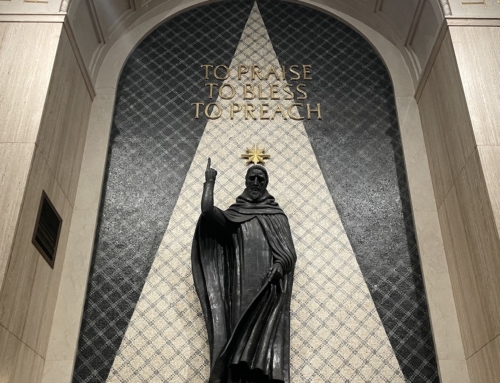Here at Dominicana we have been waxing poetically on death as the Church remembers the Holy Souls during the month of November. As Christians, we know by faith that when we die, when our immortal souls are separated from our bodies, we will immediately undergo the particular judgment for our entire life’s blood, sweat, and tears. Our soul will then be consigned to one of three “places”: everlasting heaven, purgatory (as a period of purification for heaven), or unending hell. At the resurrection of the dead, all will be raised bodily and experience the Final Judgment. The righteous will share in the bodily glory of the Risen Christ, and the damned will experience bodily suffering due to their sins. The Church will thus enjoy the inexpressible “new heavens and a new earth” (2 Pt 3:13).
In reflecting on the fate of the departed souls, we might well wonder whether these souls ever leave their abodes and interact with us. It seems the Apostles thought it possible. In the Gospel of Matthew, when Our Lord walks on water, the Evangelist recounts the fearful reaction of the Apostles: “When the disciples saw him walking on the sea they were terrified. ‘It is a ghost,’ they said and they cried out in fear” (Mt 14:26). The Apostles saw with their own eyes a feat defying the limitations of any physical man, and so they judged that they were witnessing the fearful sight of a human soul separated from its body—a spirit, or a ghost.
It seems the Apostles believed in ghosts, but what about the Angelic Doctor? There are two sources we can draw from that seem to me to give an answer. The first is the life of St. Thomas Aquinas written by Bernard Gui around the time of Aquinas’ canonization in 1323. The second would be Aquinas’s own theological writings. In his life of St. Thomas, Gui recounts two occasions where souls reportedly visited the saint: The first soul was that of Brother Romanus, the Master of Theology who succeeded Thomas in holding the Dominican Chair of Theology at the University of Paris. The second was that of his deceased sister.
When Brother Romanus appeared to Thomas while he was at prayer, Thomas did not know that Romanus had died, and so he addressed him saying, “Welcome Brother; when did you arrive?” To that Romanus replied, “I am, in fact, dead: but I have permission to visit you because of your merits.” Taken aback, Thomas asked if his own soul was in a state of grace. Romanus responded, assuring Thomas that his work was pleasing to God. When Thomas asked about his visitor’s state, Romanus informed him that he had been kept in purgatory for fifteen days but was now enjoying eternal life.
As for the visit from his sister, Gui recounts that she told her brother Thomas that she was in purgatory and in need of prayers and Masses. St. Thomas honored her request, and later while he was in Rome, she appeared to him to say that she was in glory. Again Thomas inquired as to the state of his soul, and he was assured by his sister.
These are wonderful stories, but for all we know they may have grown more fantastic over the passage of time. How about some theological rigor directly from the doctor himself!
In the supplement to his Summa Theologiae, the question is posed, “Whether the Souls who are in Heaven or Hell Are Able to Go from Thence?” Thomas answers that
“. . . according to the disposition of Divine providence, separated souls sometimes come forth from their abode and appear to men . . . It is also credible that this may occur sometimes to the damned, and that for man’s instruction and intimidation they be permitted to appear to the living; or again in order to seek our suffrages, as to those who are detained in purgatory.” (ST Sppl., 69, 3)
St. Thomas believes that souls indeed can come and visit us who still abide in the world. However, he goes on to add that the freedom for such visits differs greatly between the saints in glory and the suffering souls in purgatory and the damned. Aquinas believes that the souls in glory can come and go as they please, since it is “not unfitting for the souls of the saints to be endowed with a power in virtue of their glory, so that they are able to appear wondrously to the living when they will.”
But this raises a question: Why don’t the departed souls visit us more often? In the same article, Thomas answers saying,
It does not follow, although the dead be able to appear to the living as they will, that they appear as often as when living in the flesh: because when they are separated from the flesh, they are either wholly conformed to the divine will, so that they may do nothing but what they see to be agreeable with the Divine disposition, or else they are so overwhelmed by their punishments that their grief for their unhappiness surpasses their desire to appear to others.
This teaching of St. Thomas gives us a very valuable insight into why we should avoid being involved with fortune tellers, séances, mediums, Ouija boards, and the like. Proper contact with the dead should only come from Divine providence. On the other hand, by both his life and his teaching, Thomas teaches us that we ought to pray for the dead that they, like his sister, may quickly enter into glory.
So, did St. Thomas Aquinas believe in ghosts? You’d better believe it!
✠






